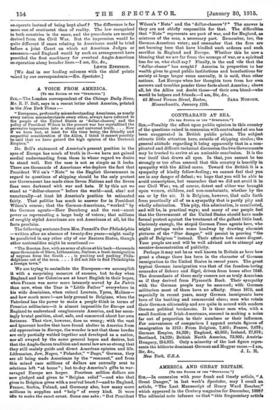A 'VOICE FROM AMERICA.
[To sax Emma or car ..Sescraroal
SIR,—The London correspondent of the Chicago Daily News, Mr. E. P. Bell, says in a recent letter about America, printed in the New York Times :— " Europeans, profoundly misunderstanding Americans, as nearly every nation misunderstands every other, always have referred to the people of the United States as dollar-chasers,' and the policy of President Wilson in the present war has crystallised the 'pervasive impression into a sharp and universal truth. . . Now rf we have lost, at least for the time being, the friendly and respectful consideration of the Allies, I think it cannot possibly be said that wo have gained the high opinion of the Teutonic Empires."
Mr. Bell's statement of America's present position in the eyes of Europe has much of truth in it—we have not gained cordial understanding from those in whose regard we desire to stand well. But the case is not as simple as it looks. There are thousands of Americans who deplore the fact that President Wil on's "Note" to the English Government in regard to questions of shipping should be the only protest our Government has made since Seven Nations and the Seven Seas were darkened with war and hate. If by this act we stand as " dollar-chasers " before the world—and, alas ! not 'unnaturally—at least let America's position be estimated fairly. That politics has much to answer for in President Wilson's course ; that the German-Americans, " worked " by the German agents—Herr Dernburg and the rest—exert power as representing a large body of voters ; that millions of roughly styled Americans are not Americana at all, let the facts proclaim.
The following sentence from Mrs. Pennell's Our Philadelphia —written after an absence of twenty-five years—might easily be paralleled in any other city of our Eastern States, though other nationalities might he mentioned:— "The Russian Jew, with an army of aliens at his back—thousands upon thousands of Slays, Lithuanians, Italians, a fresh immigration of negroes from the South . . . is pushing and packing Phila- delphians out of the town. . . . I did not like to find Philadelphia a foreign town."
We are trying to assimilate the European—we accomplish it with a surprising measure of success, but to-day when England and her Colonies are at heart English in their hopes, when France was never more intensely moved by La Patrie than now, when the Tear is "Little Father" everywhere in his wide dominions, when ruined Louvain, Ypres, Malines- and how much more!—are holy ground to Belgians, when the Vaterland has the power to make a people think in terms of Prussian militarism—it is almost impossible for Europe and England to understand conglomerate America, and her seem- ingly brutal position, aloof, safe, and concerned about her own fortunes. That view, however, does us wrong; with the vast and ignorant hordes that have found shelter in America from old oppressions in Europe, the wonder is not that thew hordes are only partially welded together and developed as a nation, nor all swayed by the same general hopes and desires, but that the Anglo-Saxon tradition and moral law are so strong that they still mainly guide and direct American opinion and life. Lithuanian, Jew, Negro, " Polander," "Dago," German, they are all being made Americans by the "remnant," and from this mixed race millions of dollars are annually sent to relations left "at home"; but to-clay America's gifts to war. ravaged Europe are larger. Fourteen million dollars are now pledged and given to "Belgian relief "—and who that gives to Belgium gives with a neutral heart P—and to England, France, Serbia, Poland, and Germany also, bow many more millions in supplies and " help " of every kind. It were idle to make the exact count. Some one asks "But President Vrdson's ' Note' and the ' dollar-chasers'?" The answer is they are not chiefly responsible for that. The difficulties that "Note" represents are part of war, and for England, as mistress of the seas, a necessary part. Remember, too, the German-American voter; and remember that the fires are not burning here that have kindled such ardours and such sacrifice in England and Europe. Whether this be now a blessing that we are far from the scourge of war, or a spiritual loss for us, who shall say P Finally, is the end vile that the "dollar-chaser" has sought P America in proportion to her wealth gives to great public institutions and benefactions for society at large larger sums annually, it is said, than other nations. Let Europe when her thoughts turn from her own sorrows and troubles ponder these facts about America; above all, let the Allies not doubt those—of their own blood—who would be helpers and friends.—I am, Sir, 8u;., 83 Mount Vernon Street, Boston, Seas NORTON. Massachusetts, January 13th.


















































 Previous page
Previous page